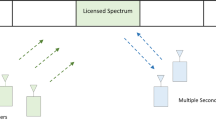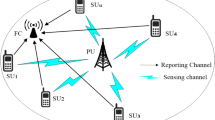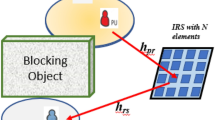Abstract
In cognitive radio systems, cooperative spectrum sensing can detect the presence of the primary user accurately. In practice, however, since the sensing observations are forwarded to a data collector through fading channels, the sensing performance is severely degraded. To deal with this problem, in this paper, we first propose a secondary user selection based cooperative spectrum sensing method to improve sensing performance by decreasing the reporting errors introduced by the fading channels. More specifically, only the secondary users with better signal-to-noise ratio (SNR) for reporting channels are allowed to send their local binary decisions (0 or 1) to the data collector while the others will send nothing. Additionally, we further propose a diversity based cooperative spectrum sensing method which applies existing space-time coding. By exploiting space diversity in CR network, the reporting errors introduced by the fading channel can be decreased and then the sensing performance is improved significantly. For either proposed cooperative spectrum sensing method, the sensing performance is derived and the analytical performance results are given. Our analysis and numerical results verify that proposed methods outperform the conventional cooperative spectrum sensing with OR-rule by taking into account the error effect on the reporting channels.
Similar content being viewed by others
References
Federal Communications Commission. Spectrum Policy Task Force. Rep. ET Docket no. 02-135, Nov. 2002
Mitola J, Maguire G Q. Cognitive radio: making software radios more personal. IEEE Pers Commun, 1999, 6: 13–18
Ghasemi A, Sousa E S. Collaborative spectrum sensing for opportunistic access in fading environments. In: Proc. IEEE Symp. New Frontiers in Dynamic Spectrum Access Networks (DySPAN’05). Baltimore, USA, 2005. 131–136
Pandharipande A. IEEE P802.22 Wireless RANs: Technology Proposal Package for IEEE 802.22. IEEE 802.22 WG on WRANs, Nov. 2005
Cabric D, Mishra S M, Brodersen R W. Implementation issues in spectrum sensing for cognitive radios. In: Proc. of Asilomar Conf. on Signals, Systems and Computers. Pacific Grove, CA, USA, 2004. 772–776
Ganesan G, Li Y. Cooperative spectrum sensing in cognitive radio—part I: two user networks. IEEE Trans Wirel Commun, 2007, 6: 2204–2213
Quan Z, Cui S, Sayed A H. Optimal linear cooperation for spectrum sensing in cognitive radio networks. IEEE J Sel Topics Signal Process, 2008, 2: 28–40
Sun C, Zhang W, Letaief K B. Cooperative spectrum sensing for cognitive radios under bandwidth constraints. In: Proc. IEEE Wireless Commun. and Networking Conf. (WCNC’07), Kowloon, 2007. 1–5
Sun C, Zhang W, Letaief K B. Cluster-based cooperative spectrum sensing in cognitive radio systems. In: Proc. IEEE Int. Conf. Commun. (ICC’07), Glasgow, 2007. 2511–2515
Urkowitz H. Energy detection of unknown deterministic signals. Proc IEEE, 1967, 55: 523–531
Digham F F, Alouini M, Simon M K. On the energy detection of unknown signals over fading channels. IEEE Trans Commun, 2007, 55: 21–24
Goldsmith A. Wireless Communications. Cambridge: University of Cambridge, 2005. 168–177
Alamouti S. A simple transmit diversity technique for wireless communications. IEEE J Sel Areas Commun, 1998, 16: 1451–1458
Author information
Authors and Affiliations
Corresponding author
Rights and permissions
About this article
Cite this article
Yue, W., Zheng, B., Meng, Q. et al. Robust cooperative spectrum sensing schemes for fading channels in cognitive radio networks. Sci. China Inf. Sci. 54, 348–359 (2011). https://doi.org/10.1007/s11432-010-4147-x
Received:
Accepted:
Published:
Issue Date:
DOI: https://doi.org/10.1007/s11432-010-4147-x




